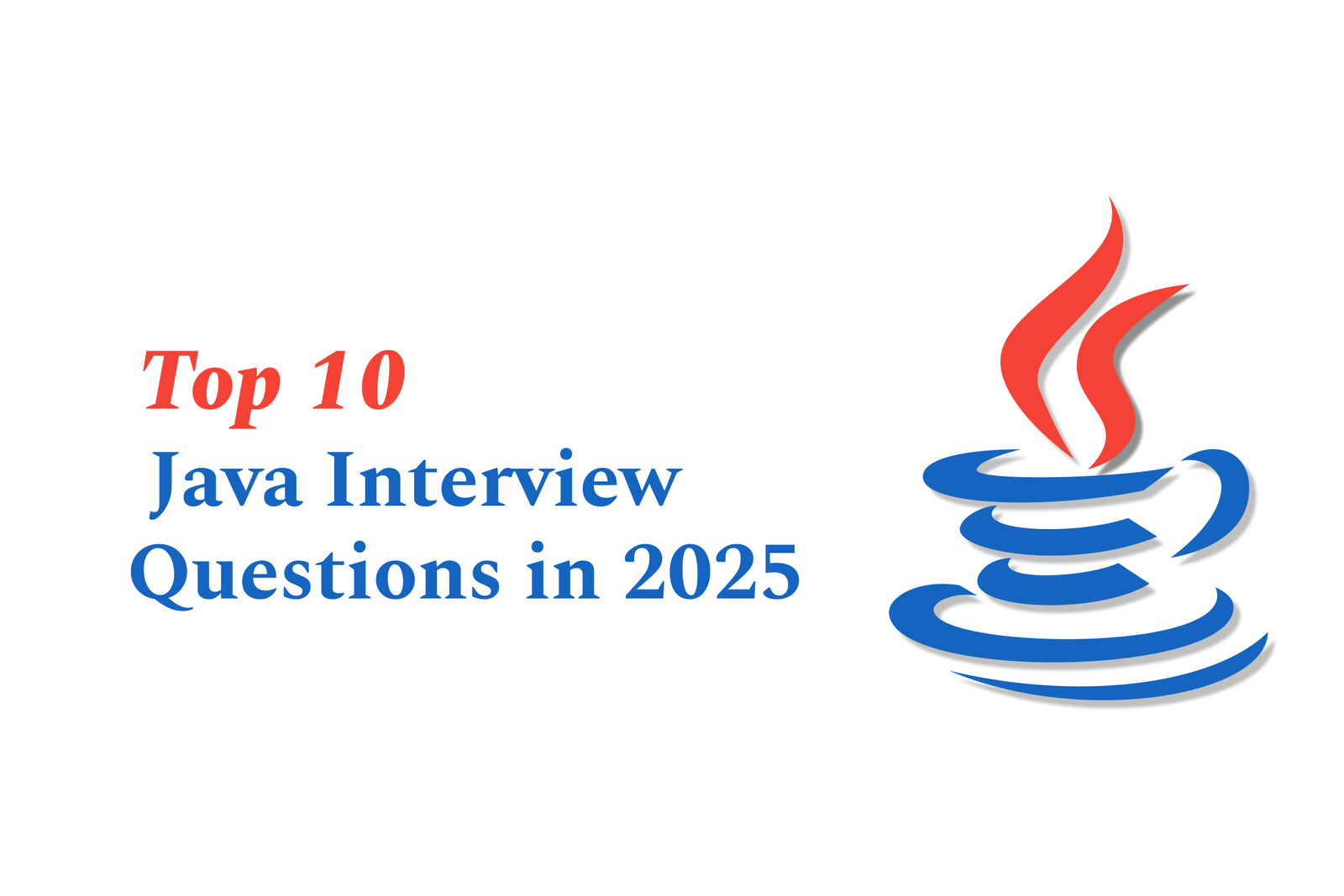Top 10 java interview questions in 2025
Top 10 Java Interview Questions in 2025 cover core concepts like OOP, exception handling, concurrency, Java 8+ features, collections, and database integration, helping candidates prepare effectively for advanced developer roles in evolving Java technology landscapes.
Top 10 Java Interview Questions in 2025
1 ) Importance of Java Interview Preparation
Java interviews require a thorough understanding of core concepts such as Core Java, Object Oriented Programming (OOP), exception handling, core APIs, and concurrency. Preparing these topics is crucial for both beginners and experienced developers aiming to excel in technical interviews.
2 ) Core Java Basics and Syntax
Candidates should be comfortable with Java fundamentals including syntax, data types, control structures, and basic programming constructs. Mastery of core Java lays the foundation for more advanced topics.
3 ) Object Oriented Programming (OOP) Concepts
Understanding OOP principles—encapsulation, inheritance, polymorphism, and abstraction—is essential. Developers must demonstrate how they apply these concepts in Java to build scalable and maintainable applications.
4 ) Exception Handling and Assertions
Interviewees need to explain Java’s mechanisms for managing errors through try catch blocks, custom exceptions, and the use of assertions for verifying program correctness during development.
5 ) Working with Core APIs
Proficiency in core Java APIs such as Collections Framework, Stream API (Java 8 features), and utility classes is expected. Knowledge of these enables efficient data manipulation and processing.
6 ) Concurrency and Multithreading
Candidates should have a solid grasp of Java concurrency mechanisms including threads, synchronization, and concurrent collections. This knowledge is critical for building robust multi threaded applications.
7 ) Practical Application in IDE and Debugging
Effective use of Java development environments, debugging tools, and best practices for writing clean, optimized code are often explored in interviews.
8 ) Advanced Java Features
Familiarity with Java 8 and later features, notably lambda expressions, functional interfaces, and streams, gives candidates a competitive edge.
9 ) Use of Java with Databases
Integrating Java applications with databases, utilizing JDBC and ORM tools like Hibernate, is a key skill for backend development interviews.
10 ) Mock Tests and Interview Practice
Engaging with real interview questions via mock tests and peer interviews helps candidates assess readiness and build confidence.
This summarized guide reflects the crucial areas to focus on for the top Java interview questions expected in 2025, ensuring comprehensive and up to date preparation.
https://justacademy.in/news-detail/flutter-vs-ionic-2025-performance
https://justacademy.in/news-detail/android-smart-home-integration-updates
https://justacademy.in/news-detail/java-developer-roadmap-2025:-what-to-learn-first
https://justacademy.in/news-detail/flutter-and-blockchain-integration
https://justacademy.in/news-detail/latest-android-camera-app-innovations
Related Posts
In 2025, top Angular libraries offer modern, feature-rich components and tools for building dynamic web apps. From powerful data grids to low-code platforms like UI Bakery, these libraries enhance development speed, UI design, and scalability, making them essential for Angular developers.
Migrating from AngularJS to Angular 17 involves gradually upgrading your app by running both frameworks together using tools like ngUpgrade, rewriting components in TypeScript, and adopting Angular’s modern architecture to enhance performance, maintainability, and long-term support.
Angular state management tools help organize and handle app data efficiently, improving scalability and maintainability. Popular options include NgRx for robust, RxJS-based patterns, and newer Signal Store solutions that offer simpler, reactive approaches integrated tightly with Angular’s latest features.
RxJS in Angular empowers developers to manage asynchronous data streams with powerful operators like `forkJoin`, `combineLatest`, and `zip`. Mastering these key operators in 2025 is essential for building efficient, reactive applications that handle complex event sequences seamlessly.
Angular performance optimization in 2025 focuses on improving app speed and responsiveness by using techniques like OnPush change detection, lazy loading, efficient data caching, and AOT compilation. These practices reduce load times, enhance user experience, and ensure scalable, fast Angular applications.
In 2025, Angular remains preferred for large-scale, enterprise apps with its robust, all-in-one framework, while Vue attracts developers seeking simplicity and fast development for smaller projects. Both frameworks excel, with choice driven by project needs and team expertise.
Angular Signals are a new reactive primitive in Angular 16 that enable fine-grained, efficient change detection by automatically tracking dependencies and updating only affected parts of the UI. They simplify state management and boost app performance, revolutionizing Angular's reactivity model.
Angular interview questions to prepare in 2025 focus on core concepts like components, directives, data binding, routing, and dependency injection, along with TypeScript mastery and latest Angular features to ensure strong practical knowledge for building scalable, efficient web applications.
AngularJS reached its official end of support in January 2022, meaning no further updates or security patches. To ensure app security and performance, developers should consider migrating to modern Angular versions or seek third-party long-term support options if immediate migration isn’t possible.
The Angular Roadmap 2025 highlights upcoming features focused on improving developer experience and performance, including zoneless Angular, Signals integration, enhanced Forms, async data handling, improved HMR, and expanded Angular Material/CDK enhancements, driving modern, efficient web app development.










